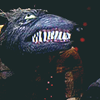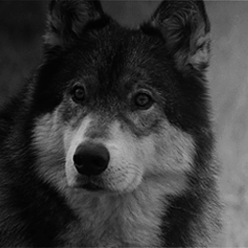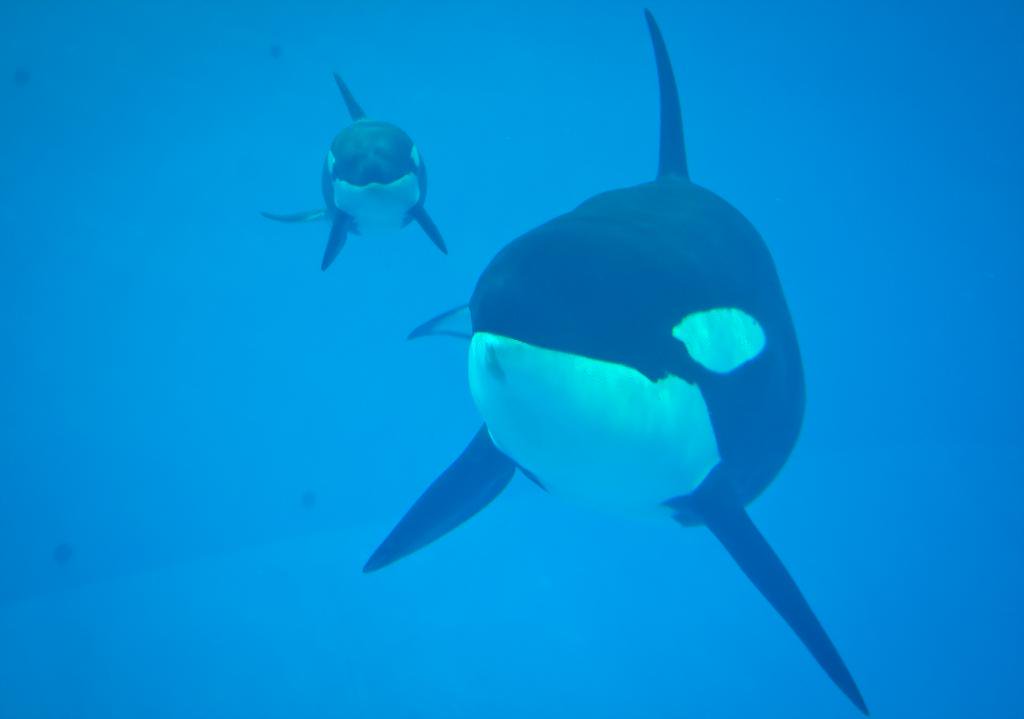Whales and dolphins are highly intelligent. They want and need to live in complex social groups. In captivity they will usually have been separated from their families, often in cruel hunts and some when they were very young.
Wild whales and dolphins can swim up to 100 miles a day, hunting and playing. In captivity they have very little space and cannot behave naturally. A concrete tank can never replace their ocean home.
The mental, emotional and physical stress that captive whales and dolphins suffer can weaken their immune systems and make them prone to disease. Even though captive whales and dolphins are kept in an environment free of predators, pollution and other threats, they die young. The death rate for infant whales and dolphins is much higher in captivity.
Captive whales and dolphins have been trained to perform tricks for food instead of behaving naturally. When not performing, they are often kept in holding tanks smaller than show pools. Confining individuals together can result in stress and aggression with no possible escape.
Capture of whales and dolphins from the wild is brutal. Entire pods may be targeted and many individuals killed or injured. Only the young and fit are taken. These are the future generations for already vulnerable wild populations and their loss has a hugely negative impact on group dynamics.
We have no right to put these amazing creatures in captivity. Captive whale and dolphin shows are not education, or conservation. Stress and disturbing behaviour is common amongst dolphins displayed in dolphinaria. Captivity is all about making money.
mods please close
Re: SeaWorld and Marine Mammal Captivity

Hey there, I'm Spotenya!
I am a in training biologist
and have an irrational love for biology, and greek mythology.
Come and support the amazing Spotsy's Animal Shelter where pets are waiting for a good home.
I have Helminthophobia, astrapophobia, Acrophobia
♥


-

Spotenya - Posts: 2902
- Joined: Thu Oct 20, 2016 3:00 pm
- My pets
- My items
- My wishlist
- My gallery
- My scenes
- My dressups
- Trade with me
Re: SeaWorld and Marine Mammal Captivity
It's like being a kid again and learning about Keiko's death... Tilly's story is sadder though for he never got to taste freedom again. At least he's free now though.
-

Roiffalo - Posts: 1300
- Joined: Fri Nov 07, 2008 12:46 pm
- My pets
- My items
- My wishlist
- My gallery
- My scenes
- My dressups
- Trade with me
Re: SeaWorld and Marine Mammal Captivity
Roiffalo wrote:It's like being a kid again and learning about Keiko's death... Tilly's story is sadder though for he never got to taste freedom again. At least he's free now though.
I agree, he's been in captivity for decades and could finally sense the freedom which he deserves a long time ago.

Hey there, I'm Spotenya!
I am a in training biologist
and have an irrational love for biology, and greek mythology.
Come and support the amazing Spotsy's Animal Shelter where pets are waiting for a good home.
I have Helminthophobia, astrapophobia, Acrophobia
♥


-

Spotenya - Posts: 2902
- Joined: Thu Oct 20, 2016 3:00 pm
- My pets
- My items
- My wishlist
- My gallery
- My scenes
- My dressups
- Trade with me
Re: SeaWorld and Marine Mammal Captivity
i read through a bit of this thread, and i feel like i should throw my two cents in since i noticed some points were not really mentioned. most people spoke out about how they needed more room, and how they weren't getting proper stimulation, so i'll try to speak on other topics. i'm completely against seaworld and everything it does, and this post is mostly geared toward those who disagree and feel that orcas can live happy and fulfilled lives in captivity.
i think the first thing worth mentioning is orca attacks. four people have been killed and several more injured by whales that were all in captivity, and yet there are no documented attacks that occur in the wild (actually, i did manage to find a single source about one "attack," but the article went on to explain how it could hardly be interpreted as an attack and more as an accident). it's interesting, really, because orcas are apex predators of the sea, and can eat virtually anything and WILL eat virtually anything. yet when these small, vulnerable humans start swimming with wild orcas, the orcas tend to have some rule that is to not eat or even attack humans. in captivity, it's an entirely different story! countless trainers have been attacked, and some even killed by the whales that they thought to be so closely bonded with. so why would captive orcas, who receive seemingly fantastic care from their human partners, feel the need to attack them? experts speculate it's from an intense build-up of stress and frustration, which seems to make a great deal of sense considering their situation. it's quite telling how seaworld eventually had no choice but to disallow trainers from entering the water, purely out of fear of losing any more people.
secondly, i think everyone knows by now just how intelligent orcas (and other cetaceans as well) are. the creatures' brains are impressively large for their bodies. they even have cultures, languages, etc. they also feel emotions, and intensely so. their brains have enlarged limbic lobes, which is essentially the source of their emotions and memories. compared to humans' brains, their limbic lobe is larger than ours. this is enough to suggest that they experience emotions stronger than we do! also, i feel it worth mentioning that they also have a part of the brain that not even we humans have, which is theorized to be linked to their empathy. so, considering how detrimental it would be for a human mother to experience her child being torn from her against her own well, it is difficult to imagine how an orca would cope with such an event. no person with any value for morals would do such a thing to a fellow human, and yet we humans do it to orcas. hypocritical, right?
going off of that we also have hours upon hours of footage of orcas exhibiting behaviour that can only be described as manic and psychotic from within their tanks of captivity. some examples include floating lifelessly at the bottom of their enclosures, swimming frantically in circles around the tank, and bobbing their heads in and out of the water repeatedly from a vertical position. some can try to argue this is "normal" behaviour, but there is no scientific evidence to suggest that... only that it is nothing but stereotypical and harmful behaviour. the only "experts" that will tell you that these actions are harmless are the ones working for seaworld. in fact, a lot of people who are pro-captivity get seem to get most of their information from those who work for seaworld. i would be wildly amazed if somebody managed to find a marine biologist who actually advocated for seaworld and operations like it.
anyway, that's about all i have the capacity to say right now. i could go on for awhile but it would mostly just be repeating what others have stated before. if you're interested in learning more about the difference between wild and captive orcas, i'd suggest looking into dr. ingrid visser. a lot of people have probably heard of her already, but she's very well educated and does a lot of work to help bring awareness to the harmful effects of captivity upon orcas. i feel quite strongly about this whole controversy, but i'll be off now to stop myself from rambling anymore since i've already written quite the novel. ^^; feel free to reply though, i love discussing this topic!
also, r.i.p. tilikum. it's a shame that the only freedom he could ever experience again was in death. ;;
-

riddlestyx - Posts: 16776
- Joined: Mon Oct 26, 2009 9:18 am
- My pets
- My items
- My wishlist
- My gallery
- My scenes
- My dressups
- Trade with me
Re: SeaWorld and Marine Mammal Captivity
@Riddlestyx- I couldn't agree more with what you've written.
R.I.P TILIKUM </3
R.I.P TILIKUM </3

-

K9. - Posts: 12263
- Joined: Thu Jul 01, 2010 1:00 pm
- My pets
- My items
- My wishlist
- My gallery
- My scenes
- My dressups
- Trade with me
-

mischa bachinski - Posts: 2027
- Joined: Wed Jul 13, 2016 4:31 am
- My pets
- My items
- My wishlist
- My gallery
- My scenes
- My dressups
- Trade with me
Re: SeaWorld and Marine Mammal Captivity
The new and last orca calf born at SeaWorld!

Image credit to: SeaWorld Facebook page.
On April 19, 2017 the calf was born. Takara is the mother. She's 25 years old and an experienced mother. She has five children: Kohana (Loro Parque), Trua (SeaWorld Orlando), Sakari, Kamea and the new calf (SeaWorld San Antonio). Takara was already pregnant when SeaWorld decided to end the breeding programme of killer whales, partnering up to the HSUS. It's still unknown what the gender of the calf could be, but from images (click) it looks like it may be a female! They don't know until official DNA test results have come back, which might take several weeks to months. And then we will also know who the father is. Since the calf was sired naturally, it's either Kyuquot or Tuar, but it's thought to be Kyuquot. This little calf has the best medical care available. It will grow up surrounded by its mother and two sisters, Sakari and Kamea, and the two males at SeaWorld San Antonio, Kyuquot and Tuar.
name's alec. legally an adult and thus paying bills. they/them or he/him pronouns have my preference.
-

Gypaetus Barbatus - Posts: 3240
- Joined: Fri Jan 27, 2012 12:29 am
- My pets
- My items
- My wishlist
- My gallery
- My scenes
- My dressups
- Trade with me
Re: SeaWorld and Marine Mammal Captivity
By now, I'm sure we've all heard of Kasatka's illness. But we've just received word of Takara's calf. Confirmed female, father is Kyuquot. She has been named Kyara. However, she has been showing signs of pneumonia. Animal care teams have separated her from her mother and have taken her to the husbandry pool to ensure she receives the necessary medication.
Source.
Source.
.:MerciResolution. Christian, Artist, RIP Tilikum. Retire Shamu:.
~Rest in Peace, J2 Granny.~
.:DeviantArt:..:Tumblr:.
"A dolphin's smile is nature's greatest deception. It creates the illusion they're always happy."
---

~Rest in Peace, J2 Granny.~
.:DeviantArt:..:Tumblr:.
"A dolphin's smile is nature's greatest deception. It creates the illusion they're always happy."
---

-

MerciResolution - Posts: 418
- Joined: Mon Sep 21, 2009 9:57 am
- My pets
- My items
- My wishlist
- My gallery
- My scenes
- My dressups
- Trade with me
Re: SeaWorld and Marine Mammal Captivity
.:MerciResolution. Christian, Artist, RIP Tilikum. Retire Shamu:.
~Rest in Peace, J2 Granny.~
.:DeviantArt:..:Tumblr:.
"A dolphin's smile is nature's greatest deception. It creates the illusion they're always happy."
---

~Rest in Peace, J2 Granny.~
.:DeviantArt:..:Tumblr:.
"A dolphin's smile is nature's greatest deception. It creates the illusion they're always happy."
---

-

MerciResolution - Posts: 418
- Joined: Mon Sep 21, 2009 9:57 am
- My pets
- My items
- My wishlist
- My gallery
- My scenes
- My dressups
- Trade with me
Re: SeaWorld and Marine Mammal Captivity

Kasatka
We are saddened to share the passing of Kasatka today (August 15, 2017) at SeaWorld San Diego. Following lengthy treatment for a bacterial respiratory infection, or lung disease, Kasatka’s health and appetite significantly declined over the past several days, despite continually tailored treatments. Kasatka’s veterinarians, who are experts in marine animal medicine, and her caretakers made the difficult decision to humanely euthanize her to prevent compromising her quality of life.
Kasatka was the beloved matriarch of our orca family. A mother of four, grandmother of six and great grandmother of two, she was considered by the most current research as an older killer whale at nearly 42 years old. Kasatka passed away at approximately 8:15 p.m. surrounded by members of her pod, as well as the veterinarians and caretakers who loved her. All of us at SeaWorld are deeply saddened by this loss, but thankful for the joy she has brought us and more than 125 million park guests.
“Today, I lost a member of my family. I have spent the past several years with Kasatka and was truly blessed to be part of her life,” said Kristi Burtis, orca behaviorist. “Although I am heartbroken, I am grateful for the special time we had together and for the difference she has made for wild orcas by all that we have learned from her. I adored Kasatka and loved sharing her with millions of people. I will miss her very much.”
While Kasatka lived a long life, we had been treating her for lung disease for the past several years. This type of respiratory condition has been identified as the most common cause of mortality and illness in whales and dolphins, both in the wild and in zoological facilities. Because of the great relationship Kasatka had with her behaviorists, she participated in daily check-ups by her veterinarians and her individualized care such as treatments using a custom-built inhaler allowing the medicine to go directly to her lungs. Over the past year, as her immune system aged, it became more difficult for her to fend off the illness and her medication took longer to have an effect. Her behaviorists and veterinarians passionately provided the finest care possible ensuring her illness was properly managed and that she continued to live a quality life up until the time of her death. The veterinary team will conduct a full post-mortem examination known as a necropsy to examine the extent of her illness and how it impacted her organ function. It may take several weeks before results are finalized.
“Nobody knows more about caring for killer whales than the professionals at SeaWorld,” said Dan Ashe, President and CEO of the Association of Zoos and Aquariums. “Having the privilege of working with these animals daily provides veterinarians and other animal care staff with the expertise and insight to make very difficult choices, like with Kasatka. Certainly, this was a difficult and wrenching decision, but I have absolutely no doubt that it was made with Kasatka’s best interest in mind. On behalf of the entire AZA family, we offer condolences to the dedicated SeaWorld professionals who have loved and cared for Kasatka throughout her life.”
At this time, the SeaWorld team’s attention remains focused on the rest of the orca pod to provide the care and attention they need.
We’d like to thank our fans and friends for their outpouring of support during this difficult time.
name's alec. legally an adult and thus paying bills. they/them or he/him pronouns have my preference.
-

Gypaetus Barbatus - Posts: 3240
- Joined: Fri Jan 27, 2012 12:29 am
- My pets
- My items
- My wishlist
- My gallery
- My scenes
- My dressups
- Trade with me
Who is online
Users browsing this forum: No registered users and 3 guests










